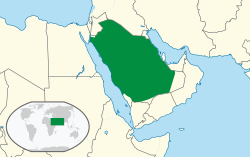Kingdom of Hejaz and Nejd
1926–1932 dual monarchy in Arabia From Wikipedia, the free encyclopedia
1926–1932 dual monarchy in Arabia From Wikipedia, the free encyclopedia
The Kingdom of Hejaz and Nejd (Arabic: مملكة الحجاز ونجد, Mamlakat al-Ḥijāz wa-Najd), initially the Kingdom of Hejaz and Sultanate of Nejd (Arabic: مملكة الحجاز وسلطنة نجد, Mamlakat al-Ḥijāz wa-Salṭanat Najd), was a dual monarchy ruled by Abdulaziz following the victory of the Saudi Sultanate of Nejd over the Hashemite Kingdom of the Hejaz in 1925. It was the fourth iteration of the Third Saudi State.
Kingdom of Hejaz and Nejd | |||||||||||||
|---|---|---|---|---|---|---|---|---|---|---|---|---|---|
| 1926–1932 | |||||||||||||
 Kingdom of Hejaz and Nejd | |||||||||||||
| Status | Dual monarchy of the Hejaz and Nejd | ||||||||||||
| Capital | |||||||||||||
| Common languages | Arabic | ||||||||||||
| Religion | Islam (Wahhabism) | ||||||||||||
| Government | Islamic absolute dual monarchy | ||||||||||||
| King | |||||||||||||
• 1926–1932 | Abdulaziz al Saud | ||||||||||||
| Viceroy | |||||||||||||
• 1926–1932 | Faisal (Hejaz) | ||||||||||||
• 1926–1932 | Saud (Nejd) | ||||||||||||
• 1926–1932 | Fahd (Ahsa) | ||||||||||||
• 1926–1932 | Muhammad (Arar) | ||||||||||||
| Legislature | Consultative Assembly | ||||||||||||
| Historical era | Interwar period | ||||||||||||
| 19 December 1925 | |||||||||||||
• Abdulaziz crowned King of Hejaz | 8 January 1926 | ||||||||||||
• Nejd decreed a kingdom | 29 January 1927 | ||||||||||||
• Saudi Arabia established and Annexation of Asir | 23 September 1932 | ||||||||||||
| |||||||||||||
| Today part of | |||||||||||||
In 1932, the two kingdoms were unified as the Kingdom of Saudi Arabia.
On 8 January 1926, Abdulaziz, the Sultan of Nejd, was crowned King of the Hejaz in the Masjid al-Haram in Makkah, and he elevated Nejd to the status of a kingdom on 29 January 1927.[1] At the Treaty of Jeddah on 20 May 1927, Abdulaziz's realm was recognised by the United Kingdom of Great Britain and Northern Ireland, and was addressed as the Kingdom of Hejaz and Nejd.
For the next five years, Abdulaziz administered the two parts of his dual kingdom as separate units. On 23 September 1932, Abdulaziz proclaimed the union of the main Saudi dominions of al-Hasa, Qatif, Nejd and the Hejaz as the Kingdom of Saudi Arabia.
The Kingdom of Hejaz and Nejd could pursue its expansionist policy with British arms supplies because of its close relations with the United Kingdom. Under King Abdulaziz, the Hejaz withdrew from the League of Nations.
In 1926, the Kingdom of Hejaz and Nejd was recognised by the Union of Soviet Socialist Republics, followed by the United States of America in 1931. By 1932, the United Kingdom, the French Third Republic, the USSR, Turkey, the Imperial State of Iran, Kingdom of Italy and The Netherlands maintained legations in Jeddah; the Kingdom of Egypt maintained unofficial consular representatives.
| Name | Lifespan | Reign start | Reign end | Notes | Family | Image |
|---|---|---|---|---|---|---|
Abdulaziz
| 26 November 1876 – 9 November 1953 (aged 76) | 8 January 1926 | 22 September 1932 | Son of Abdul Rahman bin Faisal and Sara bint Ahmed Al Sudairi | Saud |  |
| Name | Lifespan | Reign start | Reign end | Notes | Family | Image |
|---|---|---|---|---|---|---|
Faisal
| 14 April 1906 – 25 March 1975 (aged 68) | 8 January 1926 | 22 September 1932 | Son of Abdulaziz and Tarfa bint Abdullah Al Sheikh | Saud |  |
| Name | Lifespan | Reign start | Reign end | Notes | Family | Image |
|---|---|---|---|---|---|---|
Saud
| 15 January 1902 – 23 February 1969 (aged 67) | 8 January 1926 | 22 September 1932 | Son of Abdulaziz and Wadha bint Muhammad Al Orair | Saud |  |
Seamless Wikipedia browsing. On steroids.
Every time you click a link to Wikipedia, Wiktionary or Wikiquote in your browser's search results, it will show the modern Wikiwand interface.
Wikiwand extension is a five stars, simple, with minimum permission required to keep your browsing private, safe and transparent.